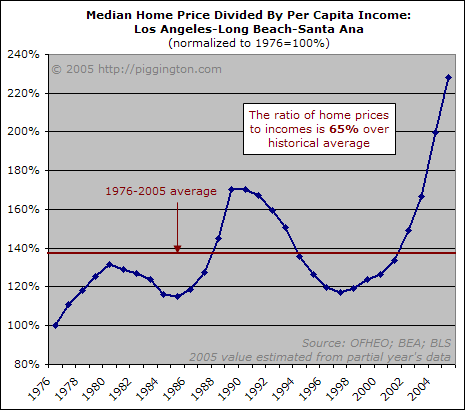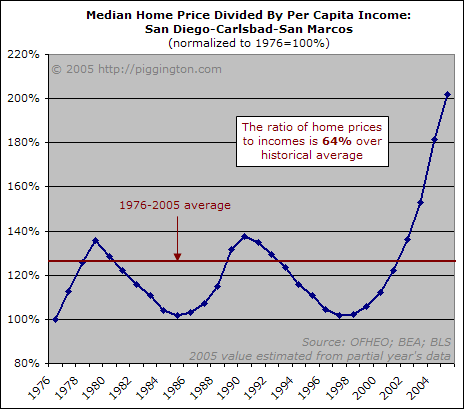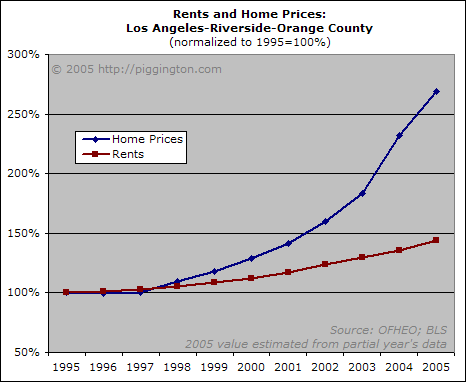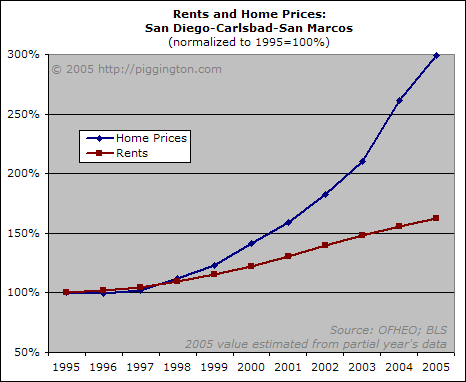"Hold off on that panic attack," suggests a piece in today’s LA Times. The implication of the article’s title and opening-paragraph reference to Chicken Little suggests that those who expect a housing price decline are simply being emotional.
The article proceeds to trot out the usual suspects for this week’s round of "permanently high plateau"-style nonsense. There is a new tack, however. While acknowledging the signs of trouble in San Diego, the article attempts to distance Los Angeles and the rest of Southern California from our fine city:
"…median home price there [San Diego] fell 1% and the number of sales dropped 24% from the same month a year ago — a tumble experts attribute largely to conditions peculiar to that area, most pointedly the overbuilding of downtown condominiums."
"Peculiar?" What seems peculiar to me is the idea that overbuilding of downtown condos could somehow be responsible for a decline in overall sales volume. Aside from the absurd idea that increased supply would cause a decrease in demand, the fact is that downtown is far too small to have any measurable effect on countywide stats. (To put this argument in perspective: ziprealty.com shows 759 homes listed downtown versus over 20,000 listings countywide).
Have a look at some graphs I put together late in 2005:




Here’s something else peculiar: looking at the above graphs and somehow thinking that whatever has gone on in San Diego over the past several years is fundamentally different than what’s happened in Los Angeles.
And perhaps most peculiar of all is the idea that analysts from the "this time (and, more recently, this place) is different" school of thought should be taken seriously, while the people who actually look at the data to understand what’s going on should be dismissed as overly emotional.

The more folks insist they
The more folks insist they are different, the more they prove they are the same.
A Vegas guy is at my blog proclaiming a “new economic paradigm” that occured 5 years ago in Vegas that will insulate vegas from the bubble.
A Scottsdale guy emphasized how Scottsdale is different than the rest of Phoenix metro because it is a very desireable place to live and still cheaper compared to Irvine. I did a post on Scottsdale showing a listing per population ratio of 1:42, (and if there’s 3 per household, that works out to a home for sale for every 14 families in Scottsdale!) hasn’t heard from the guy since.
The OC Register is always having articles about how The OC is different because, well, they are The OC!
And now LA is different.
Denial is a very powerful force. Like I said before, a guy once had a tumor on his neck grow to the size of his head before he sought medical assistance. Why? DENIAL.
Many economists and RE
Many economists and RE pundits have identified San Diego as being the canary market to watch because of our market abuses. The author of this article apparently doesn’t agree with them.
There would have been no point in bringing the canary down to the mine if the miners were going to keep working after the canary started wheezing.
The LA Times article clearly
The LA Times article clearly represents the denial phase in behavioral finance. They then accuse people with a realistc perspective as beeing “Chicken Littles”? I remember the same sentiment a few years ago when the stock market was beginning to crumble. There was a lot of “editorial propaganda” being published in the press and on the news about “not to worry, the market isn’t going to crash like people are predicting”. Well it did happen.
Rich, good job on stomping out their story. I’m getting sick of all the BS that “housing biased” editors are printing. They will soon get a reality check.
Obviously the LA Times is
Obviously the LA Times is trying to balance their RE reporting from bear to bull. Diane Wedner authors the bullish argument (interestingly the geography she is now defending is shrinking). I really do try to keep an open mind on the “soft landing” and ” permanently high plateau” argument. But as Rich pointed out on this post after a little analysis these arguments are weak and I hate to say absurd. I agree with Privatebanker the thing to take from this article is the degree of denial that still exists in this market. Daine Wedner and other RE Bulls are now at that Baghdad Bob moment “There are no tanks in Baghdad”. This article is almost, not quite, but almost to the point of satire that was represented at thereisnohousingbubble.com. I too am glad Rich exposed this for what it is.
I’ve been perusing some of
I’ve been perusing some of the more Bullish housing blogs, and, apparently, its all the fault of the media. All these silly stories about the housing market dropping is scaring away buyers….
Miss Wedner is a poor
Miss Wedner is a poor reporter for printing things that cannot be backed up. She writes: “The area’s strong, diverse economy will help prevent a market freefall similar to the one the region experienced then. “The fundamentals today are vastly different than those of the ’90s,” said John Karevoll, chief analyst for DataQuick Information Systems, a La Jolla-based real estate research firm.”
Ms. Wedner, please ask John Karevoll to show you what he means with strong diverse economy. Our economy is built on us building and selling homes to each other, and furnishing them with borrowing against our falling equity. MEW has made up for flat wages, causing more hiring in retail and tourism and restaurants.
Our technology and biotech jobs are falling, while the main hiring is in retail and construction. A real reporter should know this, and not take real estate bull talk at face value.
Ms. Wedner wrote, “That is not the case in the rest of Southern California, where in June, prices rose 7.4% from a year ago to a median of $494,000.”
Please show us how the median has done month-month. In San Diego, the median peaked in November,and has fallen every month since then. When you use year-over-year medians, you are missing the change in pricing, until an ENTIRE year has passed! Thus, your newspaper will be telling us about the price reversal a full year AFTER it has occured. Please research why prices on individual homes are dropping, while the median is rising, and you will learn that the median reflects the types of homes sold, not the price of each particular home. More accurate pricing data comes from the Case-Shiller index, which tracks the sales price of the SAME house over time. The median is skewed upwards because entry level buyers are priced out and less able to qualify for the higher interest rates, so there are fewer entry level homes sold. You make the mistake of thinking this reflects the prices of homes. The median lags the market by up to 2 years. Shouldn’t the newspaper inform us of what is happening NOW, not what happened 2 years ago?
Ms Wedner writes, “With Southern California adding 200,000 to 300,000 new residents a year, the demand for homes won’t slow anytime soon, economists say” . Please ask for the source of this data. The Census Bureau survey shows 44,000 people left San Diego in the year ending June 2005, and moved to cheaper areas in Riverside and the Inland Empire. We are losing people due to the high cost of living. Employers have many job openings. Ms. Wedner, start looking at the glut of Hiring signs in retail stores, on the back of technician vans, the banks. People are leaving So California!
Ms. Wedner, please get up to speed on the basics of real estate bubbles before you write your next story. If you print the false statements made by economists and Karevoll, at least ask them the tough questions I posed, and print their responses. Watch them squirm a litte. Why doesn’t anyone challenge their twisted perception?
I am honored that Ms. Wedner
I am honored that Ms. Wedner took the time to read my post which I sent her via e-mail, and prepared this response:
Well, it seems we have conflicting sources and different points of view. The five well-respected economists I spoke with beg to differ with you. I did not write that the market is booming and unchanged; I wrote that yes, it’s returning to a more “normal” level of sales transactions, which feels like a big decline (no bubble bursting, please—this has been challenged repeatedly by the top economists in the country), but that is because the high in this latest cycle was very, very high. In the world of business writing, we rely on year-to-year numbers because they show a longer trend. Month-to-month figures can swing so wildly that they are not, after a year, an accurate reflection of what happened over a year. I do say in my story, nonetheless, that the price increases in LA County in June were the smallest since 2000.
As for the local economy–it’s still strong. Some businesses are leaving because of high home prices, but others are arriving. We are experiencing a net population growth–I don’t make this up, I use the U.S. Census and other respected sources–and there still is a dearth of homes for all those who demand them. Houses are sitting on the market longer because many homeowners still want prices that the market will no longer bear. They tend to unlist their properties when they don’t sell. Those who price their homes at what the market will bear, are selling them. If they don’t sell in five minutes with 15 buyers vying, they think the market has crashed. It hasn’t. It’s just “average” now—homes typically and historically sit there longer than 1 day.
We still have a much more diverse economy than 15 years ago. Manufacturing, tech, entertainment, construction, service, etc. Even if one folded, which isn’t expected, the economy isn’t expected to go into a recession, which it did in the ’90s when aerospace left town.
San Diego County HAS seen a decrease in prices and sales, month-over-month. That is partly due to the abundance of speculators who jammed into the condo market and have now left. That market is not freefalling, however. Prices are still strong there. Economists are watching to see what that county does, because it could be a bellwhether of what’s to come with other markets. But not a single expert I talked to sees a crashing, bubble-bursting market. The panic is the result of buyers/sellers having gotten used to such unusually low interest rates and unusually high home prices. Where we’re headed is normal, or average, for the Southern CA home market. Not bottom-dwelling.
Thank you for your interest in my story.
Diane Wedner
Los Angeles Times Staff Writer
I, for one, liked the
I, for one, liked the cheerleading spin in this story, though my BS alarms were ringing full volume as I read it Sunday morning.
Hoping to sell within several weeks, I need maximum ambiguity out there among potential buyers as to the state of the market. Right now they’ll hear that prices have stabilized, sellers aren’t shooting for the moon anymore, and the market is normal and interest rates are still low but rising, and I like all of that. They’re all good reasons for a buyer to make a move now.
You all have convinced me (as a longtime lurker) that the decline is in motion and inevitable. That is one reason we’ll sell. Better for us for there to remain a few months’ more question as the the future of prices.
We need a buyer who is unconvinced that declines are coming, or unconcerned. I know I can sell to someone who is unconcerned and just likes the house and plans to stay. But it’s maybe twice the pool of buyers if we have more cheerleaders saying things are leveling off and that’s that — if reasonable people can disagree, we have more buyers who won’t worry about price declines.
So I’m not angry, I’m thankful that our local fishwrap took this tack.
PS,
May I assume you’ve
PS,
May I assume you’ve ruled out going to work for the L.A. Times or Dataquik? LOL
This person is a journalist – her job is to find the experts and report their conclusions. She is not an economist and she’s obviously not capable of doing the analyses that your questions require. Her skills lie in writing the article and getting it published.
This journalist is relying on economists whom she obviously trusts. No problemo. The market will sort out which side of the argument has merit and which doesn’t. So far, it’s not looking good for the bull side.
Look at it this way. C.A.R.s spokesperson was publicly bullish right up until the moment the data disproved that optimism as being unfounded. Assuming the trend continues, and I can’t imagine how it could do anything but continue, all of the economists our reporter is relying on will eventually come to the same conclusion. You can’t outrun the data.
Yeah, I was trying to bait
Yeah, I was trying to bait one of our local economists (who shall remain nameless) into going on the record here on one of the other threads, but a couple of our posters showed a little too much enthusiasm and scared him off. Too bad. That discussion could have been interesting.
Bugs, I burned my bridges
Bugs, I burned my bridges with Karevoll, Wedner, and Alan Gin. I’m sure they won’t want to hire me, hahaha.
Ms. Wedner invited me to send a SHORT letter to the editor. Does anyone else want to join me on that?
She is right: she did good research, and she quoted economists. She’s not an economist, and thus does not know what questions to ask to challenge their statements. If you want to see a real business writer, check out Danielle DiMartino at the Dallas News. She doesn’t report, she analyzes.
Rich, you’re too kind and
Rich, you’re too kind and give others more credit than you should. The “experts” need to pay for handing us propaganda, and that’s just what it is if you get down to brass tax. And the conduits for distributing that propaganda, the reporters, papers, TV, etc., are equally culpable. That’s the bottom line! It is not enough for them to call Joe Economist and toss him some softball questions and take notes on the answers. A true reporter or journalist, one that’s worth their salt, will throw in a few combination punches, will go a few questions deep on a particular train of thought. They’ll test the “experts” and question their position, rather than take it for gospel. Any 6th grader can call up an “expert” and rattle off a list of questions and take notes.
As I’ve said before, these propagandists and enablers have had enough free passes and need to be held to account. Maybe I don’t give enough benefit of the doubt to others, but I think I am pretty fair on average. This beige blog created by a jackass is a true slice of SoCal life; it’s a collection of accounts and opinions from the real…and it’s much more real than any article written by Diane Wedner.
Sincerely,
Chicken Little #1
I agree with rankandfile.
I agree with rankandfile. Has anyone seen George Clooney’s movie “Good Night and Good Luck”? Edward R. Murrow set the bar for journalism. Journalists, if they are doing their job, have a responsibility to dig beyond the propaganda in search of the truth. If Ms. Wedner is not qualified to scrutinize the statements of economists, if she can do no more than repeat them, she is not qualified to report on economic matters. If she has only talked to 5 bullish economists, and made no effort to balance that by consulting one single economist with a contrary point of view (they aren’t hard to find, Robert Shiller is one and there are quite a few right there in LA at UCLA’s Anderson School for business), she is cheerleading, not conducting “journalism”. I’ll wager she has a vested interest in the bubble not bursting. I’d be curious if she owns, how much she owns, how she financed it, etc. That would give a gauge of how unbiased her reporting is.
Incidentally, I’m still amazed at these expert economists. What qualifications must you have in order to be labeled as a reputable economist? I think you could throw a dart a wall full of random macro-economic evaluations and have a higher percentage of being right than many of these guys. Heck, pay me a 6 figure salary for making wild random guesses completely disconnected with the fundamentals. They certainly aren’t analyzing. I doubt they are even guessing. I think they are wishing, and getting paid and printed for it. Amazing!
I hate to repeat myself, but
I hate to repeat myself, but follow the money. That will lead you to the real truth behind what the media offers us…which isn’t much in most cases.
I don’t know the inner workings at newspapers, radio, or TV stations, but I imagine that they do at least a little “protecting” of those that advertise with them. I don’t think that Ms. Wedner’s personal home interests really play into what she writes, but we are all human and DO have our personal biases. I am inclined to think that the bias comes more from a leadership and cultural perspective at an organization such as the LA Times. In the same way that complaining is contagious, so are bull-ish attitudes towards housing. And the fact that those in the real estate industry do a LOT of business with a newspaper such as the LA Times speaks volumes…volumes I tell you! I personally think the all media companies should list all of their sources of revenue. This will tell us their true perspective.
Read with a jaundiced eye!
I offered to Ms. Wedner that
I offered to Ms. Wedner that she interviews economists who predict a bad economy following the housing bust, such as Thornburg, Dean Baker, and Robert Shiller. I also offered to give her a list of questions she should ask the economists next time.
She’s not interested in any of this. She will remain a writer of other people’s BS, instead of an investigative journalist of the caliber of John Stossel or Danielle DiMartino.
Ms. Wedner wrote
“Thanks for the offer to report my stories for me. But as a veteran, respected reporter, I prefer to do my own work. You should try to do some freelancing on this subject. You seem to have a great many sources and ideas and opinions—give it a try.Diane Wedner”
powayseller replied
A true investigative journalist doesn’t blindly copy what other people say. They question its validity. The stuff these economists told you doesn’t even make any sense. You are too offended to even consider that you have been duped.
A real reporter of the likes of John Stossel or Danielle DiMartino of the Dallas Morning News asks a lot of questions, and doesn’t take “experts” at their word.
I can see why the LA Times is losing readership. The “reporting” that you describe is more like a 6th grader taking notes in a class, than a college senior working on an investigative thesis.
I have investigated this story, and that’s why I know much more about this than you. I tried to help you. Your defensiveness was an obstacle though, so I have to let it go.
“Respected”? By whom? Not
“Respected”? By whom? Not anyone in this audience.
I’ve run into that “I know what I’m doing” kind of arrogance before. Some doctors do that. “I went to 6 years of medical school. You’re just a patient. I know better than you.” I know better than any doctor what I am experiencing first hand, and that flavor of doctor has always misdiagnosed me. Once someone hits that “I know what I’m doing” attitude, they stop learning, and they really start doing what they do poorly. You aren’t trying to tell her how to write her stories. You’re telling her what members of her audience really want to read. She does want to know what members of her audience would find stimulating to see economists respond to, right? Guess not.
powayseller, it would be a lark if you took her at her suggestion. Perhaps you could try to contact her economists and pose them the questions that you suggested to her, then post it on here, or offer it to voiceofsandiego, or try to bundle it up for the LA Times or the Union Tribune. I’d love to hear your questions and what the “experts” have to say in response.
Her economists are
Her economists are anonymous, whichh is really weird. She didn’t name even one of them! I am continuing this discussion in a thread started in the forums, titled Questions a Reporter Should Ask, because I think many people don’t read the comments here. I’m getting more responses in the forum area.
One of the LA Times
One of the LA Times arguments inadvertently supports the case for home price declines, but you have to read between the lines. They tout the fact that Builders “now build houses only after preselling them. That is an intelligent business plan.” Since sales are already dropping out of the sky, it means they will stop building. That means the workers will be laid off, thereby increasing job losses significantly. The worsening unemployment will also pressure home prices down. So at this point, if they build more homes, supply will force home prices down AND if they stop building more homes, the unemployment will force home prices down.